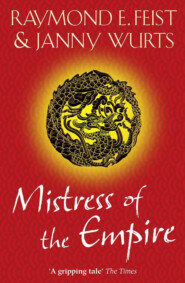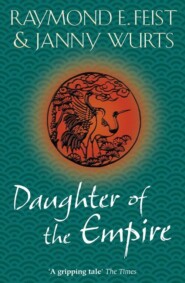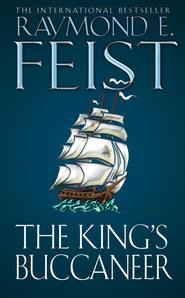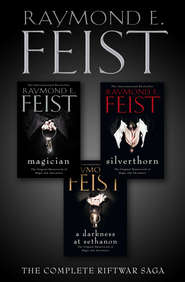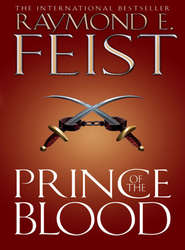По всем вопросам обращайтесь на: info@litportal.ru
(©) 2003-2024.
✖
The Serpentwar Saga: The Complete 4-Book Collection
Автор
Год написания книги
2018
Настройки чтения
Размер шрифта
Высота строк
Поля
Erik recognized the man bearing down on him, a large somber fellow named Pataki. Erik braced himself and let the man throw the first blow, which he easily caught on his shield. He stepped slightly to his left and threw a roundhouse blow with his sword that got over the top of Pataki’s shield and caught him behind the head. Erik winced, for he knew the blow must hurt, despite the helm the other man wore.
Glancing around, he saw that his companions were easily repulsing the attackers, and within a minute the clansmen threw down their swords and removed their helms in the mercenary’s sign of surrender. A few of Calis’s company cheered the victory, but the majority were content to stand motionless for a few minutes. Riding most of the day, then suddenly fighting a battle – even if only a mock skirmish – took its toll; most of the men learned to steal rest whenever it was possible, even if only for a minute.
‘All right,’ shouted Foster. ‘Pick ’em up!’
Erik got his practice sword under one arm and was starting to retrieve his pilum when he heard Billy say, ‘This one’s not moving!’
Erik saw that Pataki was still lying facedown in the dust. Roo was the first to reach him and rolled the bulky man over. He then leaned over and after a moment said, He’s still breathing, but he’s out cold.’
De Loungville hurried over. ‘What’s this?’
Erik picked up his pilum. ‘I caught him on the back of the head. I hit him harder than I intended, I guess.’
‘You guess,’ said de Loungville, his eyes narrowing as if he was about to launch into another reprimand. Suddenly he grinned and said, ‘That’s my lad!’ He told Roo, ‘Toss some water on him and get your kit together.’
Roo rolled his eyes heavenward and hurried to where the horses were picketed. He fetched a waterskin and doused the motionless man. Pataki came awake, spitting out the water, and once he had regained his feet, returned to his own company.
Erik carried his set of pilum, practice sword, and shield to where the horses were waiting. He loaded up his equipment, then waited for Roo to catch up. When the shorter man returned, he said, ‘You really caught him with that head shot.’
‘You saw?’
‘I was unoccupied at the moment. The fellow who came at me was blind-sided by Billy, so I had nothing to do.’
‘You could have lent me a hand,’ Erik said.
‘As if you needed one,’ said Roo. ‘You’re turning into something of a terror with that practice sword. Maybe you ought to keep with it when the real fighting starts. You can bludgeon with it better than most men can cut.’
Erik half smiled and shook his head. ‘Maybe I’ll find one of those big dwarven war hammers and smash rocks, too.’
‘Mount!’ came the order from Foster, and with accompanying groans the men complied.
Moving into position, Erik and Roo fell in with Sho Pi, Biggo, Luis, and Billy. The company waited. Then came the order to ride. There was at least another hour of daylight before they’d be ordered to make camp, and that would entail another two hours of work. Erik glanced at the sun, an angry red globe lowering in the west, and said, ‘It’s too damn hot for this time of year.’
From behind him, Calis said, ‘The seasons are reversed here, Erik. It’s winter in the Kingdom, but it’s early summer here. The days are getting longer and hotter.’
‘Wonderful,’ said Erik, too tired to wonder how the Captain had come to be riding next to him.
‘When we spar with the clansmen,’ said Calis, with a faint smile, ‘try to be a little more subdued with them. Pataki’s a nephew of Regin, the Lion Clan chieftain. If you’d broken his head, it would have strained things a bit.’
‘I’ll try to remember, Captain,’ said Erik without humor.
Calis set heels to his horse and moved toward the head of the line. Roo said, ‘Was he joking?’
‘Who cares?’ said Billy Goodwin. ‘It’s too hot, and I’m too tired to worry about it.’
Biggo, who rode next to Billy, said, ‘That’s strange.’
‘What?’ asked Roo.
‘The sun’s so red, but it’s another hour or more to sunset.’
Looking toward the west, they nodded. ‘What could be causing it?’ asked Luis, from his place behind Biggo.
‘Smoke,’ answered a clansman who was riding past. ‘Word came last night that Khaipur was falling. That must be it burning.’
Roo said, ‘But that’s hundreds of miles from here! At least, that’s what the Captain said!’
Sho Pi spoke softly. ‘Very big fire’ was all he said.
The training wore on, and Erik and the others no longer had to think about what to do; they just did it. Even the routine of building fortifications every night became commonplace; Erik ceased being astonished at how much work the seventy-five men could accomplish.
Once the routine was established, Calis and de Loungville would disrupt it, seeking to keep the men constantly alert. As the days wore on, Erik thought it unnecessary.
Riders came and went as messages were carried from various agents Calis had established over the years. Rather than take years to establish its control over the surrounding countryside, the host of the Emerald Queen was driving on the city of Lanada.
Riding in the second company, Erik heard Calis speaking to Hatonis and one of the riders who had just brought that news. ‘It was seven years between the fall of Sulth and the assault on Hamsa.’
Hatonis said, ‘But the invaders had to fight through the Forest of Irabek.’
‘Three years between Hamsa and Kilbar, then a year between Kilbar and Khaipur.’
Calis nodded. ‘As they control more of the continent, they seem more intent on accelerating their advance.’
De Loungville speculated, ‘Maybe the army’s getting too big to control and its generals have to keep it busy with conquest.’
Calis shrugged. ‘We need to change our line of march.’ To the rider he said, ‘Rest with us tonight and tomorrow return north. Carry word to the Jeshandi we will not be coming their way. We are going to leave the Serpent River and turn straight west. Pass the word to those who seek us that we are going to attempt to intercept the invaders between Khaipur and Lanada. Look for us at the Mercenaries’ Rendezvous.’
Erik and the others turned to look across the Serpent River, where in the distance they saw a vast valley of forests and meadows, and beyond that a small range of mountains. They would have to cross the river, ride through that and, once across the mountains, down into the river lands of the Vedra.
De Loungville said, ‘Do we turn around for the crossing point at Brek’s?’
Calis said, ‘No, it would lose us too much time. Send scouts ahead and find us a place to cross.’
De Loungville ordered riders forward, and two days later they reported a broadening of the river where the current was slow enough that rafting might be possible. Calis reached that point and agreed it was worth the try. He ordered the men to cut what little growth there was along the river to make a set of small rafts. A dozen men, including Erik and Biggo, made the treacherous crossing, poling their way from one side to the other, carrying lines that would be used to get the others across. On the far bank, the dozen men cut enough trees of a size to lash together logs into four rafts, each large enough to hold four horses. The horses for the most part cooperated, though one raft was lost on the second-to-the-last trip as a line parted and the logs broke apart. The horses and men jumped into the water as the raft disintegrated, and all the men were pulled out downstream, but only one horse made it to the shore.
There were sufficient remounts so that the losing of three horses was not a serious deprivation, but the thought of the animals drowning bothered Erik. He found that disturbing, for the specter of battle and men dying held no pain for him, but the idea of a horse, terrified as it was being swept downriver, made him very sad.
The valley swept from the fork in the river to the west, ending in a series of rising meadows, until at last they would have to crest the ridge of mountains. On the tenth day of the march, a scout returned to tell Calis of a party of hunters he had encountered ahead.
Erik, Roo, and four other men were sent ahead with Foster to negotiate with the hunters. Erik was grateful for anything that broke the monotony of the march. Every day had been toil without respite. As much as he enjoyed horses and working with them, Erik had never been a great rider. He found twelve hours in the saddle, interrupted only by walking beside the horses to rest them, making and breaking camp, mock combats, and a steady diet of dried rations more drudgery than even his worst days at the forge.
The countryside was sloping hills, all moving quickly up into peaks and crests. The mountains of this region topped out at a lower elevation than the biggest Erik was used to at home, but there were far more of them here. The three major peaks of Darkmoor were surrounded by many hills, but otherwise few true mountains. Mostly they were high plateaus and sloping hillsides. But here, while modest in altitude, the mountains were plentiful and steep, with quickly rising buttes and prominences, dead-end valleys and box canyons, hard granite cut by streams and rivers. Trees grew in abundance and none of the surrounding peaks rose high enough above the timberline to give them a clear point of reference as they traveled through the dense woods. Erik suspected this range of mountains might prove a hazard as well as an inconvenience.
The hunters were waiting at the agreed-upon location. Erik reined in as Foster dismounted, removed his sword belt, and approached with his hands open. Erik studied the hunters.
They were hill people, dressed in fur-covered vests and long woolen trousers. Erik suspected there were herds of sheep or goats secreted away in the local meadows. Each man carried an efficient-looking bow, not quite as impressive as the Kingdom longbow, but clearly powerful enough to kill a man or bear as well as a deer.
The leader was a grey-bearded man who stepped forward to speak with Foster, while the other three stood motionless. Erik glanced around and saw no sign of any horses; these men hunted on foot. Given the terrain, Erik judged that more sensible than trying to convince a horse to act like a donkey or goat. If the hunters’ village was any higher up the slopes, horses would be less than an inconvenience; they’d be a danger.






